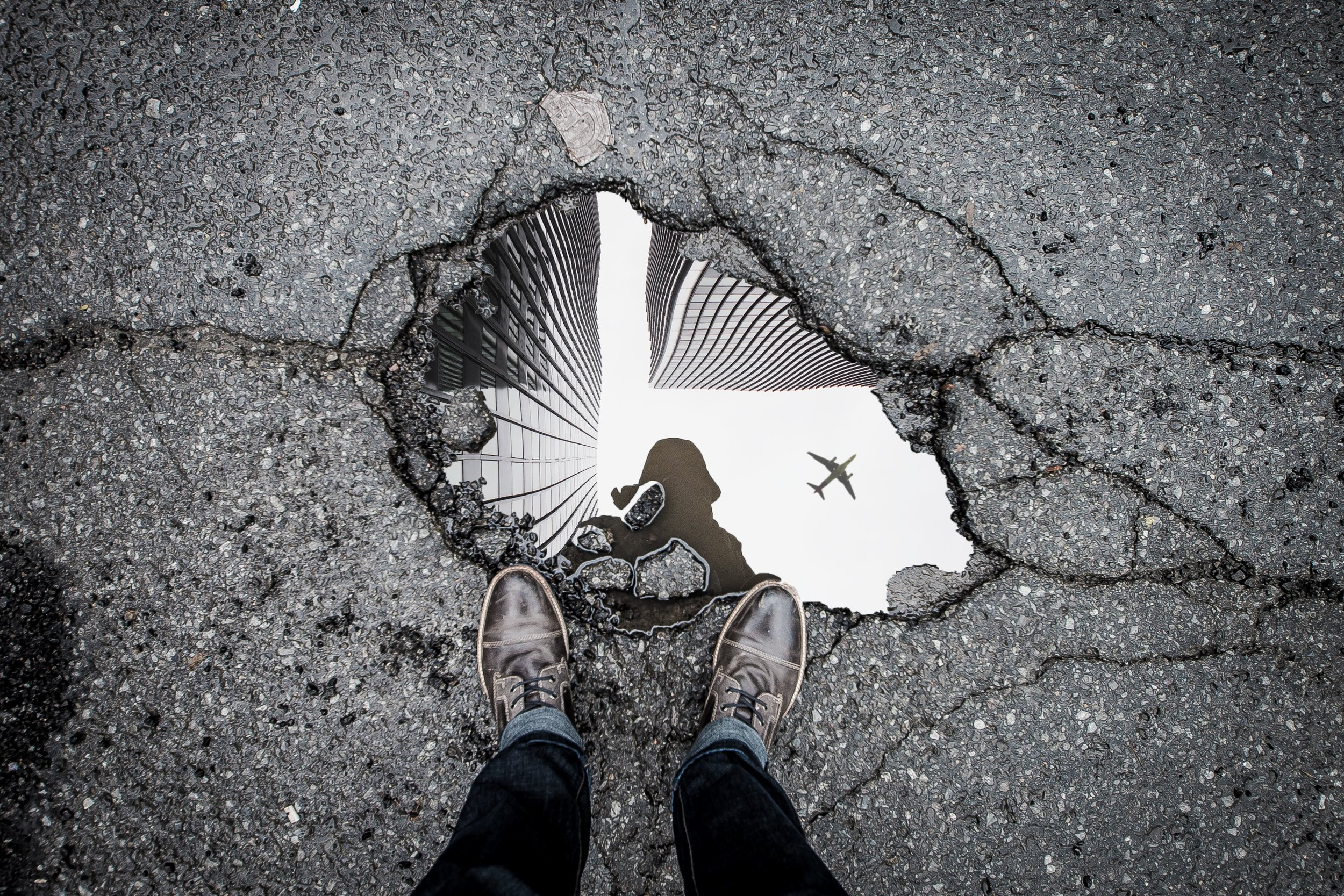The Healing Power of Gratitude

Omar Brownson might be one of the few remaining Renaissance men.
Less than 30 seconds into our interview, he quotes Tolstoy: “And yet in our world everybody thinks of changing humanity, and nobody thinks of changing himself.” Not even another minute goes by before he references Ellen Langer's work on mindfulness—and an Asaro tribe saying: “Knowledge is just a rumor until it’s felt in the bones,” which coincidentally also appears in Brené Brown’s book, Rising Strong.
Before I know it, he’s casually telling me about a recent visit to Oprah Winfrey’s home in Montecito, California on none other than World Gratitude Day, which falls on September 21 each year. Oprah was unaware of the holiday. When you teach Oprah something about gratitude, you know you’re doing something right. “That was like telling the Pope it's Christmas!” he exclaims excitedly.
It’s clear that Mr. Brownson is both well connected and well read. But does he feel what he says in his bones?
After speaking with him for the better part of two hours on a recent rainy afternoon in Manhattan, I can confidently say that the answer is a resounding yes. The co-founder of gthx, a top-10 gratitude app that launched in the App Store just before Thanksgiving, Omar Brownson is a refreshing medley of softness and strength: Half passionate entrepreneur and half empathetic, edifying father figure—a professor of gratitude if there ever were such a title.
As we sipped tea and discussed dark matter in the Universe, climate change as an existential threat to humanity, centuries-old poetry and the Japanese practice of kintsugi—Mr. Brownson eloquently and seamlessly connected these disparate disciplines and discussions with the one thing he clearly cares most about: Gratitude.
On the way home from our chat, I couldn’t help but feel grateful for the chance to meet with him. Just days prior, I saw an ad for gthx on Instagram and decided to send them a direct message and express my excitement that an app centered on gratitude actually existed. I also shared two blogs I wrote about gratitude over the past year. Just a couple of days later, a response arrived: “Would you like to meet with our co-founder? Might be perfect for another piece.”
Turns out, they were right.
[Check out my new eBook, 70 Life Lessons I Wish I’d Learned Sooner.]
Below, I share seven of the groundbreaking gratitude lessons I learned from Mr. Brownson, along with some highlights from our discussion. I hope they help you expand your horizons. I hope they encourage you to try appreciating more in your life. I’m certain they’ll open your eyes to the healing power of gratitude.
I know they did for me.
7 Groundbreaking Gratitude Lessons
1. Gratitude is replenishing.
2. It’s a social emotion—one felt in relation to others.
CR: I read in your Thrive Global piece about the difference between the diminishing returns of willpower and the replenishing power of gratitude. Tell me more about that and what you think about that.
OB: I think that ego is great for getting you up to the top of a mountain. It was about three or four years ago that I climbed Mount Whitney. It’s the tallest peak in the continental U.S., and ego is great to get you to that summit. It was probably a seven-hour hike up to 14,000 feet. Once you’re up there you gotta get back down. Then it's another five hours going down and you realize there's no glory in going down a mountain. You gotta do it. And I think we often just overly rely on ego to get us somewhere and then when we're there we're actually exhausted. And we don't really have any capacity to keep going. And so, something like gratitude is a regenerative emotion. So it doesn't deplete as you use it and I think partly why it does that is because gratitude is a social emotion.
If you want to go fast, go alone. If you want to go far, go together. And I think that's really what gratitude allows us to tap into. I think the other element to it is the difference between efficiency and resiliency. Efficiency is about how fast you can go from A to B, and control all the variables to minimize distraction. And a lot of that is ego, thinking you know all the variables. Resiliency is in some ways the opposite, which is about acknowledging everything you do not know. And actually strengthening yourself to be able to adapt to change as opposed to control everything and will the change that you want forward. I think it's an emotional resiliency that you develop when you practice gratitude and you realize that you're not doing it by yourself, that you don't know everything—but it doesn't mean you can’t evolve and grow and move things forward, it just changes your orientation in how you're trying to do it.
3. You don’t have to believe in gratitude for it to work.
CR: What would you say to someone who is skeptical about gratitude and what would you want them to take away from this conversation?
OB: You don't have to believe in gratitude, all you have to do is practice it. It’s like exercise. You don't have to believe in exercise, you just do it and when you see the benefits of it you know [it works]. The hard part is sustaining it. But that first one is all about you and that sense of it being a choice. The science shows that at a neurological level you're truly rewiring your brain. Our sense is that your brain actually rewards generosity… that we're actually designed that way. The reason we evolutionarily have gratitude is because we've always recognized that we're stronger together. This isn’t something new. You can go back to John Donne’s [poem that says] “No man is an island.” It's only when we think in these isolated ways that we actually lose hope and have to rely on more willpower which we know is a depleting resource.
4. Gratitude turns who we are and what we have into enough.
OB: Part of gratitude is recognizing that what you have is enough. And that's what I love about Brené Brown’s line that, “The opposite of scarcity isn’t abundance. The opposite of scarcity is enough.” That's what gratitude does: It turns what we have into enough.
5. Gratitude gives birth to resilience.
CR: What would you say to someone who is going through a hard time? Maybe they've lost a loved one, or they lost their job or they just got a diagnosis. You're talking about gratitude being both big and small.
OB: There's this person who I met, and he shared with me how he came to gratitude and it was through heartbreak. He was engaged to be married with his partner. He moved countries to be with him. And out of nowhere his fiancé broke up with him and he was devastated—the don’t-get-out-of-bed kind of devastation. After several days of not leaving the apartment he finally got outside and just for a glimmer of a moment felt that breath of life again. He described this Japanese pottery practice [called kintsugi]. The Emperor of Japan, his favorite tea cup was broken, and he wanted it repaired. He sent it to China and they couldn't figure it out. They were like, “Well we can put these big staples in it,” and he's like, “That's ugly.” And so he sent it to these artisans and he said, “Fix my teacup,” and what they ended up doing was repairing the seams with gold.
All of a sudden, what was broken is now healed. And in fact is worth more after than before. I think that's what pain shows us is that in our brokenness we can be healed and we can be restored and we can actually become even stronger than we were before.
It's about our ability to adapt to change. It's not that pain doesn't exist in the world and it's all joy and giggles. You know, life is tough. But how we choose to go into that practice really shows us the gold seams in our life.
CR: So gratitude is the gold that pieces us back together.
OB: Yeah.
CR: That's beautiful. That reminds me of the quote, “There is a crack, a crack in everything/That’s how the light gets in.”
6. Wherever you are, you can be grateful.
OB: We've tried to find different doorways to make you feel comfortable to just begin wherever you are. Meditation and mindfulness, in some ways, are about taking you somewhere. Gratitude is really about meeting you where you are. Because it’s already [an emotional state] in you, you don't need to go anywhere. It’s just taking the time to connect to it. Our hope is that we’ve made it as fun, easy and socially relevant as possible for you to at least get started.
7. Gratitude can help heal our society, our planet and, of course, ourselves.
CR: Any final thoughts?
OB: You can make a difference, and gratitude is the way. You can make good visible and gratitude is how you can do it.
“Gratitude is the gold that pieces us back together.”




